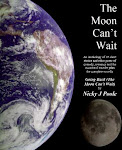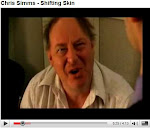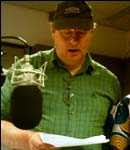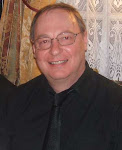Non-fiction article about what it’s like to be in a TV drama – stood at the back
The call came through just before eight o’clock in the evening on my mobile. I had switched it to silent so as not to disturb the others attending the meeting I was in. The buzz of the little phone going off in my pocket almost made me jump. You think I’d be used to it by now. I excused myself and went outside to take the call in the corridor.
"We’ve got a job for you to do."
"When?"
"Tomorrow."
"I had things planned."
"They need you in C.I.D." said my agent.
"What’s the call time?"
"It’s good, twelve noon."
I sighed. "I’ll reschedule what I had planned. I’ll be there."
"Wear the dark suit."
The industrialised hinterland of Merseyside north of Speke Boulevard, not far from the Liverpool John Lennon Airport, is a drab and dreary place that no-one in his right mind would visit on a sight-seeing trip. I turned in to one of the innumerable business parks and pulled up at the barrier.
"BBC," I said.
"Do you know where you are going?"
I knew where I was going. Formerly the offices of a potato crisp factory, this is where the BBC filmed the TV series, Merseybeat, and I where I was going to be an extra.
Not so long ago, filming on location was rare. When it did take place, there would be a fleet of large vans in green BBC livery. That doesn’t happen anymore. Reality in TV has become the order of the day as technology has improved to the point where cameras are small and portable, and much less demanding on studio level lighting. Real locations are used, even for interior scenes, and independent production companies make TV programmes. Hire vans are more common – only a few have legends on them indicating a film crew is about.
Spotting crew is much easier, principally because of their dress-sense. Difficult to describe, but impossible to miss, you head for the bunch of people meandering around that most look like refugees, in very casual clothes. Jeans, sneakers or boots, fleeces and sleeveless puffa jackets are common. On colder days this would be topped off with massive hooded waterproof jackets, and often waterproof leggings as well.
Crew roughly divide into two subtypes – one lot, basically technicians, always wear belts from which dangle every hand tool known to Man, along with bum-bags, reels of gaffer tape, clips and cables, making them look like a DIY-er’s convention, and others such as costume, hair and make-up. The other type are assistant directors and always have walkie-talkies that crackle and squawk from time to time if anything is actually happening. The technical people tend to be male and of any age, the others female, and the A.D.s young but sometimes looking half-way to being burnt out by their work.
One good thing about getting a call-time of noon was that I couldn’t possibly be here all day – unless a night shoot was planned as well, in which case we could be here till ten in the evening. The other good thing was lunch would be included. Today it was steak. But first, there was work to be done. And, first of all, that meant going to wardrobe. Mary, the wardrobe mistress, had a shooting script, a shooting schedule, Polaroids of me from my last appearance, and the tie I had to wear, plus a change of shirt. Other clothes were my own.
Being an extra is in some ways a job like any other, and in others, a job like no other. You find yourself rubbing shoulders with people who you’ve seen loads of times on TV and are famous – that is to say they are recognised by literally millions of viewers. Your face too will appear on a million TV screens – but in the background, and no-one will recognise you. They’ll probably not even notice you. All the viewer perceives is that the action of the drama they are watching occurs in " a busy place," – one with other people moving around, but in no way part of the story, and with no identity.
Nevertheless you are going to be on the Tele, and that puts some people in awe of you and they think you are famous in some way and wonder how you ever got the job. It’s not a secret. You subscribe to an agency and they get you the work. (In a few instances, some extras get work directly, but this is not so common.) To find an agency, you get a weekly newspaper called The Stage, and look in the ads at the back. There – none of that was rocket science, was it? Some agencies charge, and some just take a commission.
The next question might be "Why?" In my case, that’s simple – I needed the money! However, that’s not the only reason. I have done some amateur dramatics and I was always curious as to what it would be like to act on camera compared with acting on stage. Remarkably, very few people doing work as extras are or have ever aspired to be actors. For me, however, this often leads to the question, "What is the difference between acting on stage and acting on camera?" and for me the most obvious, if not entirely serious answer is that on camera you don’t need a prompt! Mess up, and you just do it again. And people don’t throw stuff. Apart from the crew, that is. I find it a lot less nerve-racking.
As for the money – it’s not bad but it’s not brilliant. Worst of all it’s unpredictable. You might get only one day’s work in several weeks, which is definitely not going to keep body and soul together. However, some people work at it to get a multitude of jobs so they keep busy. Nice little earners include being some sort of regular in the Rover’s Return or The Woolpack. Unfortunately, some productions don’t like to have the same anonymous faces over and over.
There are three inventions that make modern movie-making possible. One I’ve mentioned is the Polaroid, one is the walkie-talkie and the last is the mobile phone. Everybody has one. It never ceases to amaze me how rare it is for a take to be ruined by one going off – there’s discipline for you – everyone remembers to switch them off. But, between takes, the extras are whipping them out left, right and centre, phoning friends, colleagues and, of course, agents. One girl I was sat opposite to during a break had two – one for personal calls and one for business – and during the interval she was setting up work for up to six months in advance.
Another way in which the job is unusual is the variety and precocity of the start times. Seven-thirty in the morning is not uncommon and that’s just the extras. The actual actors, or principles, can be in as early as six, for costume and make-up. What a life! And shooting can go on all day, into the evening. A plus point about the early call is you get a full (and I mean full) breakfast thrown in. And, by the way, the stars all eat the same food as everyone else, either in the canteen or, when on location, the catering bus.
Besides the principles, there’s us – the extras. You’re almost never called that. Technically, on the shooting schedule you are referred to as NS – non-speaking, which is fairly self-explanatory – or SA, which rather more grandly stands for "supporting artistes." However, the ubiquitous word used by all the assistant directors is the depersonalising term "background," which is really all you are – just walking scenery.
Being background means you are herded about by A.D.s taking instructions from the first A.D via radio, and sometimes it does feel a bit degrading. But you are still an important part of the creative process (which translates as: you mess up, and everything’s messed up.) To me, the A.D.s seem to be the hardest working people on the set (which is probably why they sometimes look so weary), but that’s probably only true when there are background to deal with. They will give you simple instructions, like "Walk over there," or "Look through this pile of papers." It’s seldom complicated and, in case you were thinking of getting nervous, it’s not worth the bother. I have learned not to question any orders, or ask the A.D. anything unless it is absolutely necessary, such as, "Which side of that light/sound technician/mobile crane should I go?" I never listen to any instructions that are meant for someone else, and I never, ever ask, "How was I?" If there was anything wrong, they’d tell you (and it would probably have been their fault in the first place, unless you are a complete dummy.) It’s a bit like being in the army – you obey orders and you don’t ask questions, and I suspect the A.D.s like it that way.
There are a couple of run-throughs, rather fulsomely called "rehearsals" with everything except the camera running, just to see if it works. Then you’re ready to make picture.
Other things some people like to know include, "Is there really a clapper board? Does the director really shout ‘action’?" Some of the clichés are true. There is a clapper board, but it is now plastic with a whiteboard marker, but it’s used in exactly the same way as they always have been throughout the history of movies. Someone does shout "action," but the process is a tad more complicated. There is a sequence of events which include a call for silence, then "ready," then "turning," then "camera set," (I’ve no idea what that means) and finally, often after a long pause, the A.D. will shout "and action." No-one thinks to tell you these things the first time you are ever on set, but it is vitally important that you do absolutely nothing until that shout of "action."
The long pauses between instructions – not to mention sometimes between takes – can be baffling, but is almost invariably because some technical flaw has been spotted. Quite often, the camera is left running, without compunction, while the problem is fixed. No-one cares about wasting film – in any case it’s not film or video tape, turning on reels, as the shout of "turning" would suggest. This must be just an old convention that’s stuck. Everything is direct to digital, and fed straight into a computer in the editing suite, where the bits are assembled into a show. Nor should "turning" be confused with "turning round," which means we are all going to do exactly the same scene again, only photographed from the opposite direction so that we see the other principle’s face during a conversation. And I do mean, "exactly the same." Never do anything in a take that is so complicated that you can’t remember what it was afterwards, like scratch your head or bite a thumbnail.
Sometimes the pauses and breaks can seem interminable. Often the job is mildly boring, occasionally tedious, and sometimes excruciating. But in movies more than most jobs – labour intensive as it is – time is money, and during every delay, with actors and even seasoned crew looking wearily at the edge of their patience, someone, somewhere is hurrying – probably desperately – to fix something. No – I take that back; I’ve never seen anyone panicking to sort something out – there is just an air of quiet professional efficiency that problems are promptly dealt with.
Then comes the retakes. Even if the first take was perfect, the director will always want a "safety." Typically, however, something will not be quite right. Quite often you were still not 100% sure of what you were going to do, even despite the "rehearsal." The A.D will shout "reset," or "First positions," and you do it all again. The usual number of takes is about four. There is a high level of attention to detail, to getting it just right, but it doesn’t stretch to needless perfectionism.
After that, given the director’s nod, lights and camera, on its little trolley, and anything else that needs to be set are moved around by the ant-like army of technicians, while the actors – their one-trick-pony piece done, look on. Or, if that’s them done for the day, buzz off as speedily as anyone getting out of work early. The shooting schedule, which indicates scene lengths in eighths of a page of script, tells them when they can go home. Incidentally, despite what you may have heard about formats for screenplays, the actual script sheets are simply typed on a word processor, with very little formatting.
And, eventually, as you get to the last eighth on the shooting schedule, your feet are aching from standing around, and you’re beginning to wonder if becoming an extra was such a good idea, the final scene of the day is shot, the work is done, and you all wait for the assistant director to call out the words you are now longing to hear.
"And that’s a wrap."
THE END
.jpg)






No comments:
Post a Comment